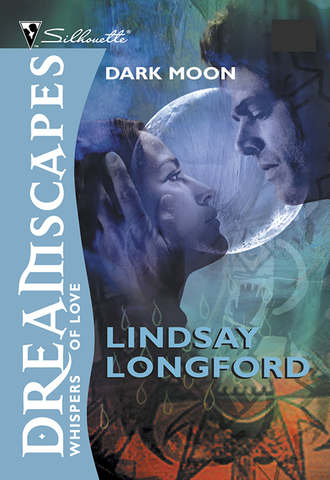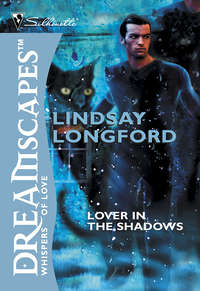
Полная версия
Dark Moon
Josie could see the square of his chin, the harsh bones of his cheeks.
But not his eyes.
“I don’t think so, Mr. Hayes,” she answered in the same vein, her voice as exquisitely polite as his, denying the frantic pumping of her heart. She turned her head, looking back toward the police station. Where was Stoner? He’d been Johnny-on-the-spot when she’d arrived. Where was he now?
“You and I need to discuss some things.”
She extended her key. “Unfortunately, I’m on my way home.” She wanted to inhale the words, take them back, as he shifted again. “I mean,” she added, spacing the words, “that I have errands to do.” She hoped the words didn’t sound as contrived to him as they did to her. She stuck the key into her car door and opened it. “People are expecting me.”
“Yes, I thought so.” He shoved his door farther open, completely blocking her. “That people were expecting you, that is,” he added, irony shivering along his dark voice.
His exquisite politeness exposed her lie as the pathetic thing she’d feared it was, but doggedly Josie stuck to it. “Friends who are stopping in for dinner.”
“I’m sure your friends won’t mind waiting a few moments. Since I’m sure they’re such close friends.” The smile that curved long furrows into his lean cheeks mocked her. He glanced at the police station. “You decided to swear out a complaint, after all.”
She edged closer to her car. “Of course I did,” she said. “What did you expect?”
There was a long pause, and then he smiled. “I expect you’re lying, you see.”
She must have blanched because he nodded.
“But you intended to swear out a complaint. If I hadn’t already entertained the gentlemen in blue. And in suits. I wasn’t sure, but I thought you would, in spite of my call. It seemed the most logical action for you to take. That’s why I approached the police first. It seemed…easier. A preemptive strike, if you will. I like to avoid trouble when I can. You should have taken my advice. You would have avoided complications for yourself.”
“I don’t know what you mean.” Her knuckles hurt with the strength of her grip on the car. The edges of her consciousness were darkening, thickening, closing in. She had to get away from him. Josie inhaled slowly, pushing back that terrifying darkness.
She should never have pulled her car in right to the edge of the chain-link fence. “Would you mind shutting your door, Mr. Hayes? I’d hate to scratch the finish. I’m sure it’s expensive.”
“Yes, in fact, it is.” His teeth flashed in the dim interior. “Very.”
No matter how she tried, Josie couldn’t see inside his car. Her eyes couldn’t adjust quickly enough between the blinding light bouncing up from the concrete and the cool shadows of his car. She examined the side of the police station. In this new building all the windows were shut and sealed against the heat and humidity, thanks to the central air. The old police station had made do with tall windows, taller ceilings and lots of fans.
This was supposed to be an improvement.
Unless you were in the parking lot wondering if anyone would hear you if you screamed.
Josie studied the ground, trying to decide what to do. A chameleon on the raised concrete next to the fence lifted one translucent green leg. She could always hop into her car and back out, ripping his door off in the process.
If she had the chance, she thought as one sneaker-clad foot came into view. She looked up and saw only the edge of dark slacks that tightened across a muscular thigh.
“A penny for your thoughts.” A copper coin spun into the air and she looked skyward. The coin gleamed as it tumbled to the ground, clinking as it landed.
“You can’t afford them. They’re worth more than a penny.”
“Of course they are. I should have known.” Still in the car and facing her, but with one foot on the concrete not far from her own, he dipped slightly forward in a seated half bow and his long fingers flashed in front of her eyes. A shower of copper pennies whirled and fell around her. One coin bounced off her shoe and rolled on its edge across the concrete. “So, lady green eyes, many pennies for your thoughts.”
“You wouldn’t be interested,” Josie said, staring at the bright copper as it vanished under her car. The coin looked newly minted.
“I assure you I am.” A second leg joined the first. His feet were slightly apart, his arm resting casually across the top of his open door, masking his eyes still. “I’m exceedingly interested in your thoughts, you know.” And he came out of the car, his lean body moving in one flowing motion.
And this time, she did step back, as far as she could, slam bang into the side of her car. She was better off not seeing his eyes, she realized. She wanted to look away and couldn’t. Caught by the dark blaze of their intensity, she stared and tried to swallow, the air growing thin and cold as she fought for breath while the rumble of his car’s idling engine became the thrumming pulse in her veins.
As if from a distance, she felt the stir of air as he stepped to the side, heard from afar the soft snick as he closed his car door, his gaze never leaving hers.
She was free.
And still she couldn’t look away from the tormented dark eyes of Ryder Hayes. More disturbing, much worse, was her realization that she didn’t want to look away. Wanted, instead, to step into that darkness and linger there, offer solace where none was asked for or wanted.
Ryder Hayes wanted something, all right, but it wasn’t consolation. Shaking free of the spell, she gasped as air flooded her lungs and she pressed back against the blistering metal of her car.
“What’s the matter, Josie Birdsong?” he said, still several feet away from her, although she felt as if he were enveloping her in darkness and cold.
Or heat. Held by the intensity of his dark eyes, she could no longer distinguish between heat and cold. In his presence, ice burned hot.
He took a step forward, stopped, slid his narrow hands carefully into his pockets as he scowled. “Am I frightening you?”
His question released her. “Yes, Mr. Hayes, you are. And I don’t like men who try to push me around, so step back. I want to go home, and you’re in my way.”
“Is that how it seems? That I’m bullying you?” he asked with only the slightest interest. But he stepped back.
“Yes.” Josie slid onto the hot seat of her car and grasped the door handle, ready to slam it at the first opportunity. “Maybe you’re even trying to terrorize me. I don’t know for sure. I can’t quite decide, but, yes, you’re definitely bullying me.”
He frowned. “Possibly I am. I’m not really sure myself what my intent is.” He leaned forward, touching the roof of her car. His arm blocked her exit as surely as had his car door. More so, she realized, since she didn’t think she was capable of running her car over his lean body. “What I do know is that I need to talk with you.”
“What you need is your business, Mr. Hayes. Not mine. And I don’t need or want to talk to you. Especially not right now,” Josie said through dry lips. She wasn’t frightened anymore. Disturbed, oh yes. But not afraid. At least not when he wasn’t holding her captive with his dark gaze. She half turned in her seat. The angle of her view hid his neck and face from her, but her eyes were on a level with the narrow silver buckle of his snakeskin belt. Remembering, she shuddered.
“What’s the matter?”
Above the gleam of his leather belt, the dazzling white of his cotton shirt moved back, away from her, and she grabbed the door. His narrow fingers closed around the rim, stopping her. “Let go,” she said. “Now.”
His fingernails were clean, square cut. “One minute. Sixty seconds. Here. At your house. Or in the police station if it makes you more comfortable. Your choice, but it’s important, Josie Birdsong. To both of us.” Soft, implacable, his voice made it impossible for her to leave. It held a knowledge that he had no right to. In its way, it was as much of a threat as his hand holding her door, preventing her departure. “Your choice,” he repeated. “Not mine, not what I want at all.”
Josie didn’t understand. He was asking her to meet with him.
“But we have to talk. As soon as possible.”
Not responding to his demand, Josie lifted her head. “How do you know my mother’s name?” He’d used it earlier, at his house. Even Bart hadn’t known.
He shrugged, one powerful shoulder scarcely moving. “Magic.”
Her heart stopped. Literally. And then it lurched forward. “Magic?” she whispered. Mellie’s word.
Not touching her, he waved his fingers in front of her and a pale pink tea rose appeared. “Illusions, that’s all. Nothing more. It’s only magic until you know the trick. The gimmick. And everything has a gimmick, Josie Bird-song,” he said, his voice taunting her. “Everything has an explanation.”
“Nobody knows my mother’s maiden name,” she said, more jolted by his knowledge than she wanted him to know.
“No?”
“No,” she insisted, tearing her gaze away from his and switching on the temperamental ignition of her car. It sputtered and died. “No one in Angel Bay knows. It’s never come up. I’ve never told anyone here, not even the bank. How could you know?”
“Magic, then, I reckon,” he drawled, a flavor of grits and redeye gravy turning his smooth voice rough. Before she could stop him, he stuck one long arm in through the open window and turned the key.
The engine purred like a tiger under his touch.
“Magic, Mr. Hayes?” Josie said, not hiding her derision.
“Luck.” He shrugged. “Or skill. But everything has an explanation. If you look for it.” He ran his flat palm along the frame of the car window. “And that brings us full circle, Mrs. Conrad. When can we meet to talk?”
“I’m not going to meet you. Not here. Not anywhere,” she insisted.
“Yes, you will.” He bent his knees and his face came into view. There was absolute certainty in his eyes. “You’ll see me. And we’ll talk. Tonight, probably.” He shut her car door very gently and she barely glimpsed the rapid flick of his fingers through the window.
The rose and a handful of copper coins dropped into her lap, a waterfall of pink petals and golden red pennies, and that fast, he was inside his car, his sneaker lifting from the concrete, disappearing into the chilled interior as he pivoted and shut his door.
Josie turned to watch his car. Its silver vanished into the white dazzle of noon heat. She picked up one of the pennies and turned it over. Like the one lying on the parking lot and the one that had rolled under the car, this, too, shone as if newly minted. She examined a second, and a third. A fourth. Curious, she opened her door and peered underneath the car, retrieving the penny there and looking at its date. All were 1962 mints. The year of her birth.
As he’d said, everything had a gimmick.
Tucking the pennies into the space in the armrest, she lifted the rose. Merely touching it released its wild, sweet scent into the car. Its pink petals were warm and supple against her palm, like fingers brushing over her skin, growing warmer as she held them against her.
All the way home, Josie smelled the rose. With no air-conditioning in her car, the heat intensified the fragrance until she couldn’t smell anything else.
When she arrived, she took the rose and put it into a clear glass bottle and placed it in her bedroom. Instantly the room filled with its subtle sweetness and she changed her clothes with the scent filling her lungs. The copper coins glowed next to the bottle.
Josie had no intention of talking with Ryder Hayes about anything. She didn’t know anything about him. She didn’t want to know anything more about him than she already did. What she already knew was disturbing enough.
She touched the rose and one petal curled, drifted to the dresser top.
Could he be involved in the children’s murders?
He’d known her mother’s name. Somehow he knew about Josie’s Seminole background, that she was a remote descendant of Josie Billie, one of the old medicine men, a heritage so distant that Josie rarely thought of it herself. Didn’t want to, if she were honest with herself. But that door opening on the past was one of the reasons she’d been so startled when he’d used her maiden name.
“Magic,” Ryder Hayes had said.
“The wind,” her mother had said when Josie was little. “The wind whispers everything.”
Josie pulled on faded shorts and headed outdoors, away from the tender fragrance of Ryder’s magic rose.
It might be real, but its hope was an illusion.
Later in the afternoon, the phone rang.
Rushing in from the garden, her hands grimy with dirt, she picked up the phone in time to hear the soft click as someone hung up.
A nuisance, but she couldn’t change her number.
Not while there was a hope that Mellie would phone her. No real hope, an illusion she couldn’t shatter. Not yet. Sometimes hope was a necessary illusion that kept the heart beating.
In a lingering flare of orange and neon pink, the sun paused at dusk before finally surrendering to a velvet black night.
Ryder had said he would see her at night.
He was wrong. She had no intention of wending her way to his decaying house. Not in the daylight. Certainly not at nighttime.
By candlelight Josie sat at her kitchen table and lifted a spoonful of mango and yogurt, put it down. The yogurt gleamed faintly in the candle glow.
She wasn’t hungry. She didn’t want to turn on the television. Didn’t want to hear about the missing boy. Eric. “Eric Ames,” she whispered fiercely. The child had a name. Eric. She didn’t want to sit on her porch.
She wanted—
Something.
Restless, the weight of her loneliness and grief pushing her into aimless motion, Josie prowled like a jungle cat through the four rooms of her house, from rose-scented bedroom to the living room where the lock she’d snapped in the morning was still in its slot. She took a quick shower and turned on a fan to circulate the muggy air as she pulled on thin cotton underpants and a loose cotton blouse over her damp skin, skin that hummed with electricity, as if there were a storm on the horizon. She peered out her window, hoping for a storm. For rain. For an end to her waiting.
The trees in the woods were motionless.
There were no yellow-eyed dogs hiding in the darkness watching her.
No storm in that clear, dark sky.
Only the occasional warble of a mockingbird, the dry croak of a frog carrying from the edge of the river where it curved away from her house.
She found herself in her bedroom, lifting the flower, stroking it across her neck, down to her breasts, over the skin of her wrists.
He’d said he would see her tonight.
Finally, sighing, she went to her porch. As she lit the candles there, she wondered if Ryder had planted a suggestion in her brain that was making her so fidgety.
Maybe he had.
She swept her hair off her face, the heavy weight too much in the heat.
And still her skin hummed, as if answering something that whispered to her on a windless night.
When she unlatched the screen door of the porch so that she could take the evening garbage out, she turned on the floodlights all around the house. She went outside toward the garage. She wanted to put the bucket with the snake in the metal garbage can that clamped shut, safe from marauding dogs and raccoons. All day she’d avoided that final cleanup, but she didn’t want to wake up in the morning and find pieces of the reptile scattered about her yard.
As she approached the garage, she saw the empty, overturned bucket.
There was no trace of the snake she’d killed, no bits of paper, no trampled bits of earth where a ransacking animal had feasted. Alarmed, Josie paused and looked around, the light hairs on her arm rising with her uneasiness. Nothing. It was as if the snake had ever been.
The empty, shiny interior of the bucket gleamed mockingly at her.
She couldn’t look away from that empty bucket.
Holding her bag of garbage out, a shield against the sight of that shiny metal, Josie backed away. Halfway to her porch she froze as she caught the minute change in the shades of darkness at the edge of the woods.
Bugs swarmed around the bright porch light, banged against the wide bulbs, clustered there until the swarm grew too thick, and heavy bodies fell to the ground.
And then he came out of the woods toward her.
She gasped and the handle of the garbage bag slipped through her fingers. Keeping his lean form in view, Josie took slow steps away from him, her breath rattling in her ears.
She’d misunderstood. She’d thought he meant she would come to his house. Stupid of her. But she’d had that sensation of being drawn, of being almost hypnotized, and so she’d misunderstood.
On one side of the screen door, her mouth going dry with something beyond fear, she faced him, the hook-andeye lock nothing more than the illusion of a barrier.
In a glance, Josie took in his appearance. Ruffled, his hair looked as if he’d dragged his hands through it repeatedly. He hadn’t shaved since she’d seen him that afternoon, and a faint beard shadowed his pale skin. His jeans rode low on his hips, and his black T-shirt was tucked into the waistband. A silver snap caught the light from the floods and sparkled momentarily as he stopped, one foot on the lowest porch step.
He nodded, as if he, too, felt that humming. “May I come in?”
“No.” Josie saw the pinpoints of the candle flames deep in his eyes. “Absolutely not. I’d be crazy to let you in.”
“Yes.” He nodded. “Right now I’d have to agree with you. You’d be crazy to let me in.” He took one step more, his sneakers soundless against the wooden step. That must have been how he’d approached her house this morning, soundlessly leaving the capsaicin and disappearing back into the woods.
“Stop,” she said, her voice cracking. “Don’t come any farther. I mean it.”
“I wasn’t going to,” he said mildly, and settled down on the steps, his form a shadow flowing over dark water. “I told you. I needed to talk to you. That’s all. And you’re right to be afraid,” he added, tilting his head to look up to her. “It’s a frightening world we live in,” he said, and his voice sighed away. “I’m afraid, too, Josie Birdsong, if you want to know the truth.”
“What do you mean? Why should you be afraid?” Her voice was too tight. Tight with fear and that humming that strung her tight as a violin waiting for the stroke of the bow to make music. “I don’t understand you, Ryder Hayes,” she said, and realized only as she spoke that she’d called him by his given name.
Some boundary had been crossed.
“I don’t understand myself, lady green eyes.”
The birds had ceased their music and there was a stillness, a waiting that made Josie’s knees tremble. She tugged at the tail of the blouse. “What do you want to tell me?”
“I’m not sure.” Ryder watched the futile twitch of her slim fingers against the edge of her blouse. Sitting on the porch below her, he saw the narrow edge of elastic on her panties. Each movement she made sent a faint drift of roses toward him.
Regardless of what he’d said in the police parking lot about meeting her, he’d tried to stay away from Josie Bird-song.
He’d failed. He should have known he would. Her long, tanned legs were behind him. If he leaned back, all the way back, his head would be against her knees. He wanted to rest against her. He shut his eyes. He was so tired he couldn’t think straight anymore. That was probably why he hadn’t been able to fight the pull that drew him through the woods to her candlelit porch.
Even her legs smelled of tea roses.
He leaned his head against the frame of the screen door.
He thought she’d be less skittish if he weren’t looking at her, but her sudden jump as he moved told him that she was as aware of him as he was of her.
And equally reluctant.
He wondered if she’d laugh at him if he told her she terrified him. He didn’t dare touch her.
Just being near her, even without touching, the feelings, the images were gathering, and he didn’t know what they meant, what was going to happen next. He’d been right. Josie Birdsong held the key.
But unlike her, he hadn’t lied. He was afraid.
Because he didn’t know what door the key would open.
“I didn’t have anything to do with the disappearance of that boy,” he said finally, not expecting her to believe him. “No matter what you think.”
“All right. Fine. You’ve told me. Now leave.”
“I can’t.” He’d been right about that, too. There was loneliness in Josie Birdsong Conrad. It lay underneath the breathiness, underneath the determination not to let him frighten her. He admired her courage, admired it while recognizing that her courage might not be enough to save her. “Can’t leave, Josie. Not yet.”
“Of course you can. It’s easy. You just stand up and walk away. Easiest thing in the world.” Her voice trembled.
The air around her rippled with her movements. He could feel those minute vibrations against his own skin. Even with his back to her, he knew what she was doing. He didn’t have to see her.
“You don’t need your hoe, Josie. I’m not going to breach the sanctity of your porch.” He shifted so that he could look at her now, could rest in the play of candlelight and shadows on her smooth, tanned skin.
She was a woman of sunlight and earth, rooted in the realities of life.
While he—
“I know you’re not. You’re going to leave. And then I’m calling the police.”
Steel in that magnolia voice. He liked that, too.
“Oh, Josie, if I wanted to, I could have already been in your house any night now for the past two months.” He flattened his hand against the screen. It bulged toward her. “You leave your windows open, your locks are a joke and you sit out here on this porch half the night.” He shook his head, and the effort to move was almost too much. “Your locks aren’t even worth my trouble.” He’d mastered locks and tumblers so superior to her pitiful pieces of steel and rusted metal that even if she’d shut her windows and locked them, too, he could have been in her house in the space of a breath.
“You’re a locksmith?”
Ryder almost laughed, but the need pouring through him left him without even the energy to smile. He felt as if he were dying of the need to touch her, to feel just once more that satin skin against his fingertips.
He wouldn’t, though. He didn’t dare. He thought he still had that much control.
But still he lifted his right hand and grasped the scratchy metal door handle. “No,” he said. “Not a locksmith. But I could be. Could have been,” he corrected himself. Too late now for that kind of life. “I’m an illusionist. I make my living with tricks.”
“A magician?” she asked in a thin, high voice.
“No. An illusionist. There’s a difference. But possibly only in my mind. At any rate, will you sit down? Please? It tires me to look up at you.”
She stiffened, ready to say something scathing, he was sure.
“Besides, the view from where I am is…well, I appreciate it, lady green eyes. I’m not sure you would, though,” he concluded and leaned against the thick wooden support of the door. “No, don’t go, not yet,” he said as she backed up toward her kitchen door. He knew it had a heavier wooden door, cheap stuff, really, like her front door. No real obstacle.
She stopped.
“Josie, come here, I want to show you something.”
“I’m fine where I am,” she said in a muffled voice. “No, stay there. Outside!” Her voice pitched higher as he rose.
But she needed to understand what was happening, needed to comprehend why he was afraid, and he didn’t know how to make it clear to her except by showing her. He’d told her he wouldn’t open her screen door. He wouldn’t.
But she would.
And so he looked at her, stared deep into her eyes that were the cool, restful gray-green of moss. He saw her eyelids droop, open, droop. “Josie,” he whispered, “open the door. Take a step closer and open the door. I won’t hurt you. I promise,” he whispered, his voice dropping lower and lower until it was only a drift in the air, a touch against her skin, her will.








